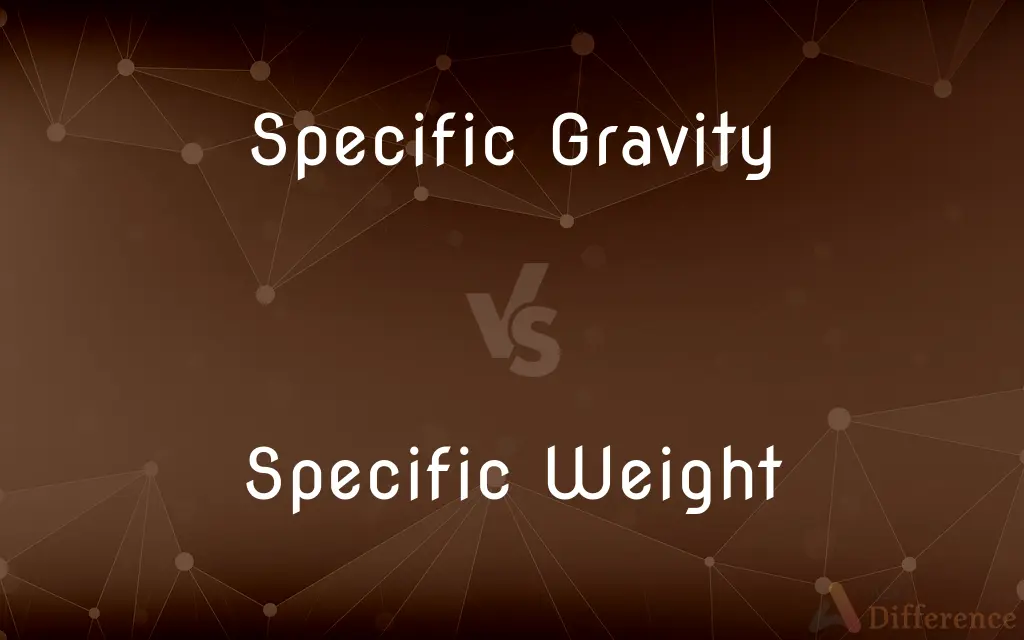Specific Gravity vs. Specific Weight — What's the Difference?
By Tayyaba Rehman — Published on December 19, 2023
Specific Gravity is the ratio of a material's density to that of water, while Specific Weight is the weight per unit volume of a material, influenced by gravity.

Difference Between Specific Gravity and Specific Weight
Table of Contents
ADVERTISEMENT
Key Differences
Specific Gravity and Specific Weight are essential terms in the realm of fluid mechanics and material science. Both offer insight into the properties of substances, but from different perspectives.
The concept of Specific Gravity is a unitless quantity. It represents the ratio of a substance's density to the density of a reference substance, usually water. Conversely, Specific Weight, also known as weight density, describes how much gravitational force acts on a unit volume of a substance.
When considering Specific Gravity, it becomes evident that it's independent of gravitational variations because it's purely a ratio. In contrast, Specific Weight is directly influenced by gravitational force, making its value location-dependent.
Specific Gravity is a valuable tool for comparing the densities of materials without the interference of gravitational differences. In comparison, Specific Weight is crucial for engineers and scientists when analyzing the weight-related effects a material might have in its environment.
It's worth noting that Specific Gravity is often used in the realms of chemistry and material science for material identification, especially in liquid mixtures. On the other hand, Specific Weight finds its applications extensively in fields like civil and mechanical engineering, particularly when considering weight-induced stresses.
ADVERTISEMENT
Comparison Chart
Definition
Ratio of a material's density to water's density
Weight of material per unit volume
Units
Dimensionless (unitless)
Typically N/m^3 or lb/ft^3
Dependency on Gravity
Not dependent on gravity
Dependent on gravity
Application Examples
Identifying materials, buoyancy studies
Studying weight-induced stresses, fluid statics
Field Relevance
Chemistry, Material Science
Civil Engineering, Mechanical Engineering
Compare with Definitions
Specific Gravity
A measure used for comparing the buoyancy of substances in a fluid.
Objects with a Specific Gravity greater than 1 will sink in water.
Specific Weight
Also termed as weight density.
Specific Weight is a critical factor when designing dams and reservoirs.
Specific Gravity
The ratio of the density of a substance to the density of a reference (usually water).
The Specific Gravity of ethanol is 0.79, making it less dense than water.
Specific Weight
Relevant for engineering problems involving weight and volume.
In fluid mechanics, the Specific Weight of a fluid is vital for pressure calculations.
Specific Gravity
Commonly used to identify the composition of liquid mixtures.
By measuring Specific Gravity, vintners can gauge the sugar content in wine.
Specific Weight
The weight of a substance per its volume, influenced by gravitational force.
The Specific Weight of water is 9.81 kN/m^3 at sea level.
Specific Gravity
A unitless number indicating a substance's relative density.
Mercury's Specific Gravity is about 13.5, showing it's much denser than water.
Specific Weight
Directly affected by a location's gravitational strength.
The Specific Weight of a material would differ slightly on the moon versus Earth.
Specific Gravity
Independent of external factors like gravity or temperature.
The Specific Gravity of a material remains constant, irrespective of its location.
Specific Weight
Describes how much gravitational force acts on a unit volume of a substance.
A high Specific Weight indicates a material exerts significant weight on its support.
Common Curiosities
Does Specific Weight change if we go to another planet?
Yes, because Specific Weight is influenced by gravity, it will differ on other planets.
How does temperature affect Specific Gravity and Specific Weight?
Both can vary with temperature as it can change a material's density, but Specific Gravity remains gravity-independent.
Can Specific Weight be negative?
No, Specific Weight is always positive since it describes weight, a scalar quantity.
Why is Specific Gravity often used in the beverage industry?
Specific Gravity helps determine the alcohol or sugar content in beverages.
What's the unit for Specific Weight?
Common units include N/m^3 (SI) and lb/ft^3 (imperial).
Can a substance have the same Specific Gravity and Specific Weight values?
No, because Specific Gravity is unitless, while Specific Weight has units of weight per volume.
Is Specific Gravity the same for all substances in water?
No, Specific Gravity varies among substances, indicating their relative densities compared to water.
If an object's Specific Gravity is less than 1, will it float?
Yes, objects with a Specific Gravity less than 1 will float in water.
Why is Specific Gravity dimensionless?
Because it's a ratio of densities, and the units cancel out.
Can we derive Specific Gravity if we know Specific Weight?
Yes, if we also know the Specific Weight of the reference substance and the gravitational constant.
Which is more affected by external conditions, Specific Gravity or Specific Weight?
Specific Weight is more affected, especially by changes in gravity.
Is Specific Weight used in buoyancy calculations?
Specific Weight can be used, especially when considering the weight of fluid displaced.
In what scenario is Specific Gravity preferable over Specific Weight?
For materials comparison without location or gravity considerations, Specific Gravity is preferable.
If the density of a fluid is known, can we determine its Specific Weight?
Yes, by multiplying the density with gravitational acceleration.
Share Your Discovery

Previous Comparison
Schwann Cell vs. Oligodendrocyte
Next Comparison
Iodine vs. Iodine TinctureAuthor Spotlight
Written by
Tayyaba RehmanTayyaba Rehman is a distinguished writer, currently serving as a primary contributor to askdifference.com. As a researcher in semantics and etymology, Tayyaba's passion for the complexity of languages and their distinctions has found a perfect home on the platform. Tayyaba delves into the intricacies of language, distinguishing between commonly confused words and phrases, thereby providing clarity for readers worldwide.













































